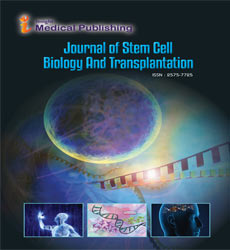ISSN : 2575-7725
Journal of Stem Cell Biology and Transplantation
Antidepressants and Male Infertility: Involvement of Spermatogonial Stem Cells Self-renewal Disruption
Ali Shalizar Jalali*
Histology and Embryology Research Laboratories, Department of Basic Sciences, Faculty of Veterinary Medicine, Urmia University, Urmia, Iran
- *Corresponding Author:
- Ali Shalizar Jalali
Histology and Embryology Research Laboratories
Department of Basic Sciences
Faculty of Veterinary Medicine
Urmia University, Urmia, Iran
Tel: 00984431942593
E-mail: a.shalizar@urmia.ac.ir
Received date: February 20, 2017; Accepted date: February 22, 2017; Published date: February 27, 2017
Citation: Jalali AS. Antidepressants and Male Infertility: Involvement of Spermatogonial Stem Cells Self-renewal Disruption. J. stem cell Bio. transplant. 2017, 1:1.
DOI: 10.21767/2575-7725.100005
Nearly 350 million people are affected by depression world-wide and antidepressants are the most commonly used medications [1,2]. Recently, it has been reported that the percentage of Americans on antidepressant therapies had nearly doubled, increasing from 6.8% to 13% and selective serotonin reuptake inhibitors (SSRIs) are the most commonly used antidepressant [3]. In line with that, it was also found that SSRIs treatment can lead to sexual side effects in 55% of patients [4]. Moreover, experimental evidence revealed that SSRIs administration depletes testicular germinal epithelium resulting in defective spermatogenesis and reduced male fertility [5,6].
Spermatogonial stem cells (SSCs) as self-renewing adult stem cells in the testis are responsible for regulated continual spermatogenesis throughout the most of a male’s lifespan and their biological activities can be influenced by chemicals and/ or radiation induced testicular damages [7,8]. Supporting these facts, it has been shown that SSRIs are associated with SSCs self-renewal suppression in adult rats confirming the possible involvement of these compounds in male germline maintenance disruption [9].
Accordingly, since antidepressants may cause severe testiculopathy, profound considerations should be given to the drastic consequences of their increased consumption.
References
- Pilania M, Bairwa M, Kumar N, Khanna P, Kurana H (2013) Elderly depression in India: An emerging public health challenge. Australas Med J 6: 107-111.
- Davey CG, Chanen AM (2016) The unfulfilled promise of the antidepressant medications. Med J Aust 204:348-350.
- Kantor ED, Rehm CD, Haas JS, Chan AT, Giovannucci EL (2015) Trends in Prescription Drug Use among Adults in the United States from 1999-2012. JAMA 314: 1818-1831.
- Ferguson JM (2001) SSRI antidepressant medications: adverse effects and tolerability. Prim Care Companion J Clin Psychiatry 3: 22-27.
- Bataineh HN, Daradka T (2007) Effects of long-term use of fluoxetine on fertility parameters in adult male rats. Neuro Endocrinol Lett 28: 321-325.
- Hajizadeh Z, Soleimani Mehranjani M, Najafi G, Shariatzadeh SMA, Shalizar Jalali A (2016) Black grape seed extract modulates fluoxetine-induced oxidative stress and cytotoxicity in mouse testis. Jundishapur J Nat Pharm Prod.
- Grewenig A, Schuler N, Rübe CE (2011) Persistent DNA damage in spermatogonial stem cells after fractionated low-dose irradiation of testicular tissue. Int J Radiat Oncol Biol Phys 92: 1123-1131.
- Singh SR, Burnicka-Turek O, Chauhan C, Hou SX (2011) Spermatogonial stem cells, infertility and testicular cancer. J Cell Mol Med 15: 468–483.
- Akbari H, Hasanzadeh S, Shalizar Jalali A (2016) Fluoxetine suppresses spermatogonial stem cell self-renewal in adult rats. Int J Fertil Steril.
Open Access Journals
- Aquaculture & Veterinary Science
- Chemistry & Chemical Sciences
- Clinical Sciences
- Engineering
- General Science
- Genetics & Molecular Biology
- Health Care & Nursing
- Immunology & Microbiology
- Materials Science
- Mathematics & Physics
- Medical Sciences
- Neurology & Psychiatry
- Oncology & Cancer Science
- Pharmaceutical Sciences
